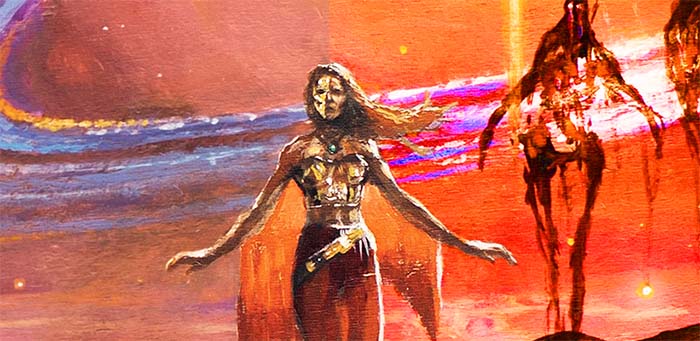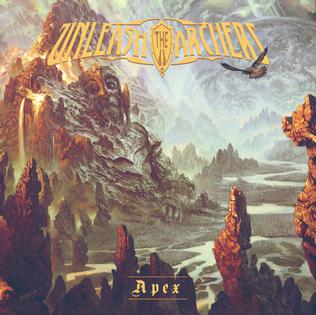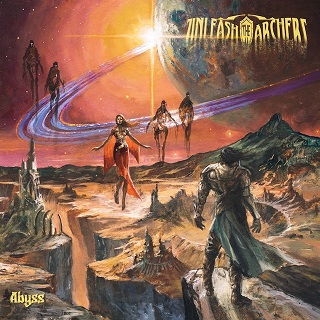Apex and Abyss: A Thematic Analysis
In the world of storytelling, form and content are commonly understood as binary opposites. As any good storyteller will agree, though, the way in which a story is told (the form) is often just as important as the story itself (the content). Film and literature have exhibited their merits as mediums fit for the fantasy genre. Film can depict fantastical scenes with carefully drawn visuals or special effects. Literature can use whole chapters of purposeful language to describe a vivid scene or battle. But, how does music fare as a form for fantasy?

Canadian metal band Unleash The Archers experimented with this idea for their studio albums Apex and Abyss, released in 2017 and 2020 respectively. In today’s music — regardless of the genre — the songs on an album are usually connected by a recurring topic, theme, or sound. Rarely do they present a chronological story though, and it is even rarer still for that story to be a work of absolute fiction. But, labelled as concept albums, both Apex and Abyss do tell a fictional story from beginning to end, with each song acting as a scene or chapter.
Concept albums are certainly not new, but they are also not common. Thus, discussion of their strengths and weaknesses as a medium for fiction is underrepresented in literary analysis. Using the works of Unleash The Archers, this article intends to argue that music can be a creative and effective medium for meaningful storytelling. This will be done through a discussion of the three major themes which Apex and Abyss manage to present within a collective run-time of just two hours. Attention will be given to the role music plays in conveying these themes.
Apex and Abyss: A Synopsis

The story, beginning with the ten-track album Apex, follows the actions of Immortal — the protagonist who is, of course, immortal. He spends his life in sleep in a mountain, and only wakes when someone chooses to wake him. He is bound to the person who wakes him and must do as they say. Thus, the album’s opening track marks his awakening from a slumber of more than a thousand years.
Listeners learn that he has been awoken by the story’s antagonist, The Matriarch. She requires him to hunt and capture her four sons so that they can be sacrificed for a ritual which will make her all-powerful. Immortal is the only being powerful enough to do this job for her; and due to his curse, he has no choice but to seek out the sons and deliver them to their deaths. As an extra incentive, The Matriarch promises to break the curse which requires him to do the bidding of others if he is successful in finding her sons.
Accepting that this is something he must do, Immortal sets out to find The Matriarch’s family. Three of the sons either hide or fight back; their actions harm others which allows the Immortal to disassociate from the deplorability of what he is being made to do. However, Immortal befriends the final son — who has a son of his own — and finally begins to feel the weight of this task The Matriarch has asked of him. After travelling far and wide, he successfully delivers the men to their deaths and The Matriarch is given her ultimate power.
Unsurprisingly, she betrays Immortal; she does not break the curse as promised. He has no choice but to return to his hibernation state until he is needed once more. However, the album ends somewhat optimistically with Immortal accepting his fate. Rather than lament this betrayal and what could have been, he simply acknowledges that this is his life. He is devoid of hope but he is okay. The album ends, then, with the protagonist retreating back into the comfort zone that is his mountain.

The story picks up fifty years later in the sequel, Abyss, with the opening track acting as a bridging scene between the first album and the second. Immortal is in a liminal state; he is somewhere between consciousness and unconsciousness. He soon wakes up though, and finds himself in space, rather than on Earth as he was in Apex. After a prolonged period of uncertainty he learns why he is awake. It is not The Matriarch this time, it is The Matriarch’s grandson (or, the child of the man Immortal befriended in Apex) who has given him life again.
The Matriarch’s grandson initially seeks out Immortal to harm him and get revenge for his father’s death. Once Immortal is awake though, he soon realises that it is his grandmother whom he should be angry with. He decides that together, both he and Immortal will destroy The Matriarch. Then, he will finally set Immortal free. After a heated pursuit, Immortal defeats The Matriarch in battle. She is dead which means that he is free.
This freedom is not without sacrifice though, as the grandson was caught in the crossfire. Immortal is devastated by the death of his friend; but, the grandson tells Immortal to enjoy his freedom knowing that he will always be in his heart guiding him. The saga ends, then, on something of a cliff-hanger. As he walks towards his future, Immortal — no longer bound to be a servant to evil — has a choice to make. Will he use his power for good or for evil? Listeners are left to speculate what choice he will make. Throughout this fantastical tale, the following themes are explored.
Power
The theme discussed most prominently within the two albums is power. The story’s main characters — Immortal and The Matriarch — have comparable strength and power. However, the way they perceive this within themselves is dramatically different, altering the outcomes of their actions. The third track on Apex titled ‘The Matriarch’ introduces the capabilities of the character. It is the only song on both albums told from the perspective of a narrator divorced from the action, suggesting a greater degree of objectivity. The song explains:
“The day she came to power our lives forever changed
Never before a darkness like this have we seen
No end to suffering
All hail our mighty Queen.”
The song is fast-paced and the vocals are harsh; more so than the two songs before it which focused on Immortal. The lyrics, “The Matriarch!” are repeated and often growled. These effects, paired with the lyrics, work to impress to listeners the immense threat that this character poses. There is no mistaking that her power is perceived as inherently negative.
Her title as ultimate ruler suggests that she already possesses great control. Despite this, Apex focuses on her cruel desire to heighten her power. The following song, ‘Cleanse the Bloodlines’ is told from the perspective of The Matriarch and similarly demonstrates her capacity for evil. In this song, the antagonist is explaining to Immortal the job he has been summoned to do; find her sons and deliver them to be killed. The vocals are once again harsh, and are sung with a tone indicating arrogance. Her demands for power reach their pinnacle, with the following lines growled — the first time on the album that a full section of the song is delivered this way:
“Unearth my descendants, find them and bring them to me
Feed my insatiable lust for blood.”
It is clear that this character does not want to do good things with her power; indeed she murdered her four children to obtain it. This is further evidenced later in the album when she betrays Immortal by not breaking the curse as she promised. She is willing to use and harm whomever she needs for her own personal gain.
This has an unexpected consequence for her though. Once Immortal has been successful and The Matriarch’s power is increased, her strength becomes a source of narcissism for her. This is ultimately her downfall; she begins to believe she can never lose. On Abyss, the track titled ‘Return to Me’ demonstrates this perfectly. The song documents the antagonist’s anger at the fact that Immortal has been brought to life by someone other than her. This part of the story — told from the perspective of The Matriarch — is something of a narcissistic rant:
“Try as you might, you can’t escape your doom
I am alpha, rule absolute
Think you can win?
I know you only can lose.”
As listeners learn, that line — “I know you only can lose” — proves to be false. In the same song she talks of how “futile the fight” with her will be due to her “assured victory.” The song ‘The Wind That Shapes the Land,’ just three songs later, proves that her egotism was not well-founded. Immortal defeats her in a fierce battle. The song begins slowly, with lengthy, drawn out lines. However, as the battle intensifies, the pace of the song increases. The lines of the song are delivered in short bursts adding to the feeling of it being a high-stakes juncture in the story.
One verse of the song is delivered in growl and it is The Matriarch’s words telling Immortal “you know you won’t prevail.” Her narcissism is again on full display and, indeed, it is her own wonderment at her powers that allows Immortal to get close to her. The battle ends with Immortal reaching out and using his own physical strength to literally crush her to death:
“Firm within my grasp I hold the spark and shatter it
See her eyes go darkCould it be I’ve finally won the war now?
I see the clouds are gone
The storm that raged is quiet once again
I feel the stars above
Shining on the fragments that remain.”
The malevolent power that The Matriarch exudes can be juxtaposed with Immortal. He has great power due to his status as an immortal, but he does not necessarily perceive this. Throughout the two albums, the protagonist acknowledges that he is one of this fictional universe’s most powerful figures. He understands that his capabilities can have a great impact on his world: “my power is the tipping point.” Rather than flex this power, he would much rather return to his mountain and sleep. He longs for comfort, not blood.
Despite his enormous strength, it never devolves into narcissism as is so apparent with The Matriarch. In Abyss, just before the battle he will ultimately win, he spends a significant amount of time simply running from his opponent in the song ‘Faster Than Light.’ Lacking faith in his own abilities, he and his friend decide to “fly till the stars collide, till we live or die.” Even once he decides to turn and fight, his responses are still underpinned by an inherent scepticism in his own abilities:
“Why do I not turn and fight? And see if I somehow might, set myself free
Why do I feel so alive? As if suddenly I somehow find, I’m where I should be?”
This apprehension means that he is cautious. During the battle song, even when he is at an advantage, the lyrics still impress that he is careful. The line “Could it be…?” is repeated twice; he asks himself important questions before moving forward. Rather than hold a false belief in his own power and strength, he only uses this when necessary and when he is informed of the dangers present.
Looking at this comparison of powerful figures, the album offers a lesson on humility. Both beings were born into power, but one handled this better than another, and ultimately won. If one looks at the conclusion of this saga and decides to discern who is rewarded for the behaviour and who is punished, Immortal’s actions are clearly advocated for over his enemy. He, who is powerful but humble, concludes the story free from his curse, living the life he always yearned for. The Matriarch, in contrast, equally as powerful but not humble in the slightest, ends up dead.
For this reason, the Apex and Abyss saga is interesting as its exploration of the theme of power does not conclude with the overall message that power is inherently bad. This is surprising, as it is a lesson in which many fantasy tales do try to impart. Instead, in just twenty songs, the albums convey the point that powerful figures are an unavoidable part of life. What matters, then, is how that power is used.
Good Versus Evil
A natural extension of this exploration of power is a rumination about good versus evil. This is something which Immortal is constantly made to grapple with. That The Matriarch was an awful being was established early on in the story; she chose evil and was happy with that decision. Immortal, however, even at the saga’s conclusion, struggles with which path he should choose.
He begins Apex feeling disconnected from the bloodshed he is directly contributing to. Tracks five to eight depict Immortal’s capture of each son. The first of these — titled ‘The Coward’s Way’ — shows the protagonist’s apathy towards this task: “you’re just another job that’s to be done before I’m free.” In the next song, ‘False Walls,’ Immortal begins to feel justified in his acts of violence, as he learns that, like The Matriarch, the sons are not good people either:
“Like his brother before him I feel no remorse
He will lie upon the altar, a well-deserving course.”
Immortal’s capacity for evil reaches its peak in the next song, ‘Ten Thousand Against One.’ He even begins to show a degree of arrogance, as he explains that he will simply take down every man in the third son’s army to get to him, because it is his fate to do so. This song is a rousing and fast-paced track, with the words “Ten Thousand Against One!” chanted repeatedly. It resembles the narcissistic ranting tracks sung from the perspective of The Matriarch — demonstrating the influence she has on him.
This does not last long though and the following song, ‘Earth and Ashes,’ shows plainly how torn between two worldviews Immortal really is. In this song, he meets the fourth son who has a son of his own. Rather than fight back, this fourth son accepts that his death is unavoidable and instead befriends his captor:
“He takes me out to the hills, we’re like old friends walking
But it’s a charade, both of us know there’s no other way
All despite what I’m feeling, he’s such a wise companion
But I’m just wasting time, he will die.”
The protagonist is left to feel the consequences of what he is forced to do, he expresses that he feels “haunted” by the bloodshed he has been responsible for. Not just due to The Matriarch as, before her, he had to commit the violent crimes of other evil beings. From this point on, he demonstrates a shift in his behaviour. He becomes less willing to blindly accept that his power is destined to be used for nefarious means.
Progressing to the final track of the saga, ‘Afterlife,’ this torment between good and evil is most pronounced. Rather than offer a clear-cut ending, listeners are left wondering which way of life Immortal will ultimately choose. The song contains two vocalists — one calm, one growling — who are designed to represent good and evil, respectively. The song is a depiction of Immortal’s thought processes as he enters into his life free from the curse. Suddenly possessing his own agency, will he choose to use his power for good or for evil?
The following lines which conclude the song — and, thus, the album and saga as a whole — demonstrate this inner debate. The first and third lines are growled, representing Immortal’s capacity for evil. The second and fourth lines are sung by the part of him that believes in being good and honourable:
“Don’t waste your chance to seek revenge at last
I won’t waste my freedom, vengeance will not make me whole
Fight back you fool, make them pay for transgressions past
Fear not your anger, use it to rise up and free your soul.”
The protagonist’s continued inward battle over how he should behave demonstrates the tension between acting for the good of others, or the opposite. It would be easy to create a protagonist who is the antithesis of The Matriarch in every conceivable way. However, having him exist on either side of good and evil makes for a nuanced character. The album is a clear advocate for good — as is expected — but creating a main character that must grow to achieve this shows a sophistication that even some long form literature misses. Apex and Abyss‘ discussions of good and evil impress to listeners that self improvement is possible.
What is interesting about the album’s discussion of this theme is how closely intersected it is with the notion of friendship. In the beginning of Apex, the only loyalty Immortal feels is towards The Matriarch. However, this is an obligatory bond, and not friendship. It is during this time that he is most likely to behave callously. However, befriending the fourth son serves as a turning point for him. Being shown genuine care and compassion sparks his pursuit of being a better person.
This is most pronounced in the ninth track on Abyss — ‘Carry the Flame’ — wherein Immortal suffers the loss of his companion, The Matriarch’s grandson. The song is one of the slowest and saddest across the two albums. It is sung with two vocalists, both as gentle as one another. It is presented as a heartfelt conversation between the protagonist and his friend who is dying after getting hurt in the battle which ended The Matriarch. Immortal is unsure how to continue without his friend, to which his friend tells him:
“My guiding light
Fire in the night
I am with you wherever you are
Your guiding light, shining bright.”
Heartbreakingly, the vocalist intended to represent the dying friend fades out earlier than the one representing Immortal, signalling the death of him. The song’s chorus continues several times without this second voice; Immortal is once again alone. Though the album never definitively states whether he chooses either good or evil, this song suggests that he will choose to be good. Immortal believes that, without his friend, “all would be lost.” Thus, the albums stress the impact that receiving care and love has on a person’s actions. This is something that The Matriarch — and her inclination for evil — ultimately never had.
Hope and Fate
The final major theme — or rather, themes — explored within these albums is that of hope and fate. This connects with the previous two themes in that it deals with Immortal’s ideas of accepting his curse and using his power to harm others because he feels he is destined to do so. As a result of this blind acceptance, he learns not to hope for anything more. But, as with the other themes, Immortal undergoes a significant character arc.
Unlike the previous two themes, Immortal’s dealings with what he perceives as his fate — and his inability to hope for greater than this — is only a peripheral concern. However, as his circumstances change, the protagonist’s perception of his own role in his world shifts.
In the saga’s opening track, Immortal expresses his blind acceptance of his never-ending life of servitude. As he states matter-of-factly, “fear not the task ahead there’s no escaping it.” In the following track, titled ‘Shadow Guide,’ the character wanders aimlessly just waiting for instructions on where he is to go. No curiosity or agency; his life is determined by others. He even says so himself, he “can’t help but follow” those who wake him. These opening tracks are useful in setting the scene of the story and providing necessary contextual detail. However, they also subtly point to Immortal’s acceptance of his fate.
As previously discussed, when carrying out the task asked of him by The Matriarch — that is, the capture of her sons — Immortal believes that it is simply something he must do. Then, when The Matriarch betrays him by not setting him free from his curse, he is once again made to acknowledge that this is just how his life is. The song ‘Call Me Immortal’ — which, the title in and of itself shows his resignation towards self improvement — expresses this idea. The song’s opening lines demonstrate this:
“Despite the promise made to me to let my soul be free
Revealing upon my return intentions to betray
Yet all the same the fact remains I knew it was a lie
In all these years I’ve learned to hope is no way to survive.”
Perhaps, then, his acceptance of his so-called fate can instead be understood as a lack of hope. Connecting this idea to the previous themes, until this point in the story, Immortal has only seen power being used for evil. Therefore, to hope that it could be different is not possible for him. In the second album, however, this hopelessness and acceptance of his unhappy existence begins to shift to a determination to improve the world he inhabits.
Compared to the pessimism of the first album, several songs within the second album express hope more so than an acceptance of a pre-determined fate. The track titled ‘The Wind That Shapes the Land’ depicts this movement away from resignation and towards active participation in his own journey with lyrics such as:
“Search within, uncover the will to win
Turn against the tide that washes o’er.”
This is similarly explored in the saga’s closing song ‘Afterlife,’ where he is encouraged to “finally be who you are inside” and to “embrace the afterlife” (the afterlife here referring to his new existence free from the curse). These lines are delivered with much gusto and are best described as rousing and uplifting. The precedent set by his thousands of years of servitude suggests that it is his fate to use power for evil; but it is his hope for a better life that allows him to choose goodness instead.
These ideas are fairly abstract and appear not to hold much relevance outside of the story, unlike the two themes previously discussed. However, in an explainer video of the albums, the band’s lead vocalist contextualises this within the real world. As she explains, Immortal spends the duration of Abyss unlearning to blindly accept what makes him unhappy — which was something he had learned throughout Apex. This can translate to people learning to make their own life choices — such as those relating to careers or family — which might go against what is expected of them. As she states plainly; Immortal’s “path is not determined…just like in life for the rest of us.”
Thus, not only is the music able to convey these themes relevant to the vivid imaginary world, it can also translate to a real life context. Drawing this small connection between Immortal’s fictitious struggles and the real world demonstrates that the albums Apex and Abyss are works of fiction comparable to other fantasy tales.
More than just entertainment, stories serve as valuable cultural artefacts for the lessons they can impart. Immortal’s complex and conflicting interactions with each theme discussed here proves that thoughtful concept albums can tell important tales. These albums entertain as they were likely designed to do, however, it is worth acknowledging that their merits reach beyond this.
Rather than an irrelevant factor, the music itself — or the albums’ forms — help to convey the contents of the story. Various musical choices help to fill in gaps in the scene-setting that are created by the medium’s very nature, such as the natural brevity of songs and a lack of accompanying visual aids. Thus, subtle choices, such as using more than one vocalist or having dramatic shifts in tempo, help to convey crucial details to the listener or create tension necessary for the story’s progression.

Concept albums are not new. One famous example is Pink Floyd’s 1979 album, The Wall, which is a rock opera chronicling the story of a jaded musician who isolates himself from the world. Another is My Chemical Romance’s 2006 rock opera, titled The Black Parade, depicting the story of a man who has died and uses his afterlife to reflect upon his former existence.
Though they differ from the purely fantastical subject matter of Apex and Abyss, examples such as this show that musicians have uncovered the story-telling potential of music for decades. More than this though, their positive critical reception and fan enthusiasm shows that listeners are open to this form of narrative delivery. Thus, the albums discussed here serve as a useful case study to highlight the story-telling capabilities of music, and the ways in which the form itself can set it apart from other works of fiction.
What do you think? Leave a comment.











You captured this so well Samantha. If you’re ever on a two hour car ride, listen to apex and abyss back to back. the music and the storytelling both are so phenomenal easily two of my favorite albums.
That sounds awesome, I’ll have to try that out sometime!
Thank you! I enjoy the albums on their own, but I agree, listening to them back to back is necessary to really appreciate the storytelling!
I love every song especially Abyss, Through Stars, and Soulbound but The Wind That Shapes The Land is THE song on that album.
Literally discovered this band on the official release of this new album. Cant stop listening to them. Absolutely phenomenal.
In my humble opinion, this album is the album that catapults Brittney to a Tier 1 metal vocalist, as if it were ever in doubt.
This was an amazing article and you made some really great connections. Great work! I’m sure UTA would love to read this!
Unleash The Archers is a favorite metal band. You made my day. What are your favorite top five tracks? Mine are:
1. Awakening
2. Abyss
3. Cleanse the Bloodlines
4. General of the Dark Army
5.The Wind that Shapes the Land
Bonus pick: Northwest Passage
– Awakening
– Apex
– Legacy
– Northwest Passage
– Carry the Flame (What? I like power ballads).
I would probably have included something from their earlier stuff if they had better mixing/mastering/performances. The songwriting seems pretty solid, but pre-Time-Stands-Still-Brittney was not as developed and Time Stands Still is borderline unlistenable for me because of production decisions, so I only really know Apex and Abyss.
1) Daughters of Winterstone
2) The Outlander
3) Dreamcrusher
4) City of Iron
5) Awakening
1. Apex
2. Awkening
3. Return to me
4. False Wall
5. Heartless World
I discovered the band some time after they released Apex and have yet to really listen to their older songs. Thats primarily why my top 5 are primarily from their more recent releases.
I’m yet to listen to anything else by them that isn’t these two albums, but each of these lists are making me think I should!
Call Me Immortal
The Matriarch
Faster Than Light
Tonight We Ride
General of the Dark Army
Damn. I knew the story of Apex but nothing about Abyss so thank you im sure this took a little while to write. Im probably going to relisten to the album to get the feel of each song.
It did take a while, but it also gave me an excuse to listen to the albums over and over and that is nothing to complain about!
I hate their earlier albums, but Apex and Abyss slap. I think Soulbound was one of my most played songs from last year.
And listening to them back to back creates such a good story. Glad that the Immortal’s ending was left to interpretation.
“Legacy” and “Guiding Light” (or is it called “Carry the Flame”? Idk, the second to last song) are two of my top 5 favorite UtA songs.
I’m always looking for decent bands like this. Check out Brother’s of Metal. A viking themed metal band that tells the stories of the old norse gods. If I’m not listening to Unleash the Archers it’s usually, Brothers of Metal.
I absolutely love the Track Emblas Saga on their latest album! These two bands are my personal go-to’s as well and I feel they are highly underrated. I guess it’s not for everyone. Have you heard Highlander (the one) by Lost Horizon? It’s a rare gem, with ridiculous high, powerful vocals, melodies, and guitar riffs that last 12 minutes without much repetition imo. Possibly THE most powerful power metal song. It’s a shame considering the band broke up due to contrasting religious beliefs.
I’ll have to look Highlander up its sounds epic! I like long powerful songs.
I’ve read that large portion of UTA’s sound were Inspired by them, along with Judas priest, iron maiden & Dio.
I’ve always been a fan of UtA but man Apex blew me away, the story just added another layer. I’m gonna hit Abyss just been listening to it a bit here and there.
The last song Afterlife particularly gives new meaning to the 2 albums. I feel that the point is no matter what terrible things you’ve done/faced, just let that person die (figuratively), reject negativity, and live your afterlife.
That is exactly right! I think that was a really beautiful point for the saga to end on.
The story and themes just elevates what are already great albums to another level.
I always thought abyss was, like, thousands of years after apex.
You would think that but the fourth son’s son goes from child to adult so I always kinda figured they could only be about 50 years apart at most.
The last verse of the song Apex has the lines “Brother mountain / now we sleep / for a thousand years. / I will see you again”.
Is that the same person you’re talking about? Could it be they somehow “hybernated” for a thousand years?
Not sure if you have seen the vocalist’s explainer videos on YouTube, but she states in one of them that Abyss takes place 50 or so years later (which makes sense seeing as the son is still alive).
I can’t tell you a thing about music theory or whatnot, but I’m glad someone else shares my sentiment of how incredible this group is.
Amazing article. To the readers, for continued dives, I highly recommend the track by track videos by Brittney, she clarifies a lot of the vague references in the lyrics. Certainly worth the watch!
Thank you so much, and yes, I completely agree! They were necessary research for this article, actually.
I’m having a lot more fun listening to Abyss. It’s so strong start to finish and the songwriting is on another level yet again. Where I’d think it couldn’t get better after Apex, Abyss proves there’s another 10% to go after 100%.
Crazy to say right? Apex is one of the best power metal albums out there, but Abyss for me is more consistent and more entertaining start to finish. They took the best parts of Apex and added layers, and then turned the dial to 11.
I agree! I have preferred Abyss from the get-go but not been able to understand why exactly, but this articulates perfectly why that is.
Everything about this group, especially Brittany comes off as so sincere. Sounds like they put their hearts and souls into what they make.
Thematically the whole story is so good. I have these both on constant repeat. Just awesome!
As a standalone, Abyss has sequelitis. As a cohesive whole, it’s one of the best things ive heard in years, probably the best since winters gate by Insomnium or Odyssey to the West by Slice the cake.
I think I personally prefer Abyss to Apex. But that might be because I listened to it first, who knows? But yes, both albums are at their absolute best when they are enjoyed as a whole.
I feel like Apex stands alone quite well.. it’s one of the best albums of the decade IMO.
They are pretty precious. It’s easy to become someone who doesn’t pay attention to the words, much less the story, and just listens for the music. Even for people who appreciate good writing. It’s just not that common to find a band with real lyrical depth, and after a while you stop looking for them.
I have listened to Abyss nearly non stop since it was dropped. The entire album is amazing. And the narrative was just so good!
This album was the perfect follow up to Apex. I love the huge 80’s sound they recreated without being super cheesy. Was it better than Apex? Who cares! It’s not a competition. It’s what I personally needed it to be and love listening to these albums from front to back, which I believe was the intended structure.
I’m coming in as a new fan. I was listening to a Spotify metal playlist on shuffle, and I think “Abyss” came on. I have been mildly obsessed with them since. I’m taking the time to go to albums before Apex, but as a new fan who got brought in due in part to Brittany’s amazing voice, those older albums don’t feel quite as impressive vocally (I really have barely made the plunge into those albums to be fair though).
Throughout they are intensively impressive and technically proficient, and I genuinely look forward to dragging my middle aged self out to one of their shows in the future.
Their first 3 albums are a little less accessible for most but they’re pretty good. “Tonight We Ride” and “Time Stands Still” are my favorite pre-Apex songs personally.
I probably need to give Apex and Abyss more of a chance. I think the general consensus is that they’re far superior to the first three albums but… I don’t know… I really prefer Demons and Time Stands Still by a significant margin.
Re-listening to these songs now. You have done great work in analysing the themes.
Thank you so much for this feedback!
I’m saving this to read later! This is my fav metal band.
Wooow. You changed everything for me.
I can’t even describe how much of a whole new life the music took on for me today. Songs that I had already listened to on repeat until I was sick of them suddenly were completely fresh and beautiful. When I came to The Wind That Shapes the Land (specifically the part where that exact lyric happens), I cried like I haven’t cried since I heard the ending of Shoemaker by Nightwish.
I’ve listened to concept albums before, but these are something truly unique and endearing to me. They are concise, cohesive, and expertly complemented by the arrangements. I already loved the music, but without following the lyrics a lot of it blended together and seemed repetitive. Now every stanza is so emotionally distinct for me. It’s like I’ve been watching a 3D movie with 2D glasses all this time.
This is, hands down, the most generous comment that I have ever received on one of my articles. I just write about what I enjoy, and while I know that it gets read by many people, to think it can have such an impact is honestly a little mind-blowing. Thank you for this comment!
But I also agree with what you are saying. These albums are incredible and powerful and hold so much depth that is easy to miss if you are not looking for it.
I was thinking the setting was a sort of quasi-medieval sci-fi setting like He-Man. Sword & sorcery & lasers.
Brittney is just such a class act in every way. Yes, she’s beautiful and yes, she sings amazingly, but it’s how she treats her role in UtA with such respect that sets her apart. She is without a doubt one of the most dedicated, professional vocalists I’ve ever heard. There’s no half-assing it, winging it, or “good enough” with her. Absolutely everything is a conscious, strategic, purposeful decision in pursuit of her craft, and it shows.
Brittney truly is an awesome talent – this is a great summation of the passion for her craft!
I don’t think I like Abyss as much as Apex, but it’s definitely my 2nd favorite UtA album after Apex, if nothing else. I did like Abyss more as I listened to it the 2nd time, so I may get to like it even more as time goes on, but I still think Apex will be better in the long run for me.
Their writing is great, I mean they’re no Holopainen, but they can still write deep.
Listening to them both as a cohesive story is unreal!
I always figured it was more their bodies in a sort of non corporeal state chasing each other through the cosmos.
The immortal wakes up and thinks;
– My mountain is gone, I’m surrounded by steel
From the first verse of abyss.
I feel like Abyss album doesn’t have much identity, there’s loads of stuff going on, and loads of things they try to do, some of it works, and some of it doesn’t, but I feel like they’ve sacrificed identity and songwriting for experimentation. Apex is still a standout, stellar album, and hopefully they can come back to that zone, with even tighter songwriting,
The identity of the album is how well the songs fit the story in most every way.
I think Abyss is the perfect followup thematically and I think the synthy direction they took makes perfect sense.
My first few listens to Apex resulted in me being a bit lost and bored during a couple of the “brother songs” but that changed once I dug in and grasped the concept of the story on that section.
I had the exact same experience! As soon as I begun to understand the story that was unfolding, my engagement with the album increased hugely.
Such an epic climax to the story of the albums.
To be honest I’m very disappointed by Abyss. I loved Apex so much, and it was such a development from their previous work. It had my favorite elements of 3 Inches of Blood, Lost Horizon, Judas Priest… That new record had such a plastic production, and the Synths are soooo cheesy and annoying (coming from a massive power metal fan) and most of the chorus are just bad.
I much prefer their more recent stuff but there’s a couple of gems in their back catalogue!
I kinda imagined them in like winged ironman suits, feels kinda epic with the way Faster than Light is written.
Great article! I think that music is a meaningful artform that has the potential to tell a story through the lyrics and the sounds that deliver a particular mood and message.
Apex had been the most played album for me since it came out.
There seem to be certain flairs from the late 60s in this music.
Finally,I’ve always thought that music had it’s own storytelling…I really appreciate this story,wow
It’s really clear,and loved the entire story
Fantastical! A really great exploration of themes here, wonderful.
Fantastic article !
Wow, 2 wonderful albums ! The storytelling is so good that I can hear a riff and know exactly where it fits in the whole story